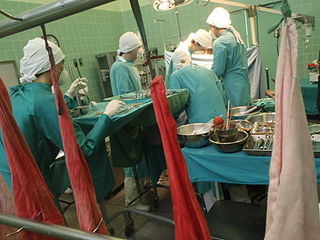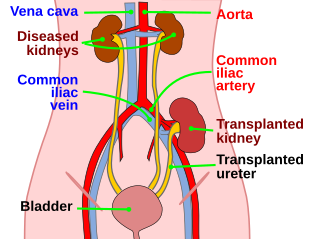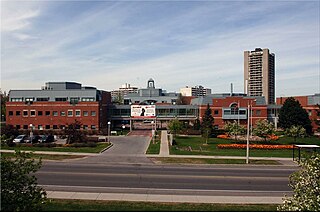
Organ donation is the process when a person allows an organ of their own to be removed and transplanted to another person, legally, either by consent while the donor is alive or dead with the assent of the next of kin.

Organ transplantation is a medical procedure in which an organ is removed from one body and placed in the body of a recipient, to replace a damaged or missing organ. The donor and recipient may be at the same location, or organs may be transported from a donor site to another location. Organs and/or tissues that are transplanted within the same person's body are called autografts. Transplants that are recently performed between two subjects of the same species are called allografts. Allografts can either be from a living or cadaveric source.

The Toronto General Hospital (TGH) is a major teaching hospital in Toronto, Ontario, Canada and the flagship campus of University Health Network (UHN). It is located in the Discovery District of Downtown Toronto along University Avenue's Hospital Row; it is directly north of The Hospital for Sick Children, across Gerrard Street West, and east of Princess Margaret Cancer Centre and Mount Sinai Hospital. The hospital serves as a teaching hospital for the University of Toronto Faculty of Medicine. In 2019, the hospital was ranked first for research in Canada by Research Infosource for the ninth consecutive year.

Kidney transplant or renal transplant is the organ transplant of a kidney into a patient with end-stage kidney disease (ESRD). Kidney transplant is typically classified as deceased-donor or living-donor transplantation depending on the source of the donor organ. Living-donor kidney transplants are further characterized as genetically related (living-related) or non-related (living-unrelated) transplants, depending on whether a biological relationship exists between the donor and recipient.

Canadian Blood Services is a non-profit charitable organization that is independent from the Canadian government. The Canadian Blood Services was established as Canada's blood authority in all provinces and territories except for Quebec in 1998. The federal, provincial and territorial governments created the Canadian Blood Services through a memorandum of understanding. Canadian Blood Services is funded mainly through the provincial and territorial governments.

The United Network for Organ Sharing (UNOS) is a non-profit, scientific and educational organization that administers the only Organ Procurement and Transplantation Network (OPTN) in the United States, established by the U.S. Congress in 1984 by Gene A. Pierce, founder of United Network for Organ Sharing. Located in Richmond, Virginia, the organization's headquarters are situated near the intersection of Interstate 95 and Interstate 64 in the Virginia BioTechnology Research Park.

The Canadian Institute for Health Information (CIHI) is a government-controlled not-for-profit Crown corporation that provides essential information on Canada's health systems and the health of Canadians. CIHI provides comparable and actionable data and information that are used to accelerate improvements in health care, health system performance and population health across Canada.

The University of Alberta Hospital (UAH) is a research and teaching hospital in Edmonton, Alberta, Canada. The hospital is affiliated with the University of Alberta and run by Alberta Health Services, the health authority for Alberta. It is one of Canada's leading health sciences centres, providing a comprehensive range of diagnostic and treatment services to inpatients and outpatients. The UAH treats over 700,000 patients annually.
The American Society of Transplantation (AST) is an international organization of over 4,000 transplant professionals dedicated to advancing the field of transplantation through the promotion of research, education, advocacy, organ donation, and service to the community. It is the largest professional transplantation society in North America.

Robert Provenzano is an American nephrologist. He is also an Associate Clinical Professor of Medicine at Wayne State University School of Medicine.
The Canadian Society of Transplantation (CST) is the professional organization for physicians, surgeons, scientists and allied health professionals working in the field of transplantation in Canada. It was founded in 1980 and has grown to include over 600 members in 2008.

Francis L. Delmonico, MD, FACS is a surgeon, clinical professor and health expert in the field of transplantation. He serves on numerous committees and is affiliated with various leading organizations and institutions. He is the chief medical officer of the New England Organ Bank (NEOB) and Professor of Surgery, Part-Time at Harvard Medical School in Boston, Massachusetts, where he is emeritus director of renal transplantation. He served as president of The Transplantation Society (TTS) from 2012 to 2014, an international non-profit organization based in Montreal, Canada that works with international transplantation physicians and researchers. He also served as the president of the United Network of Organ Sharing (UNOS) in 2005, which overseas the practice of organ donation and transplantation in the United States. He was appointed and still serves as an advisor to the World Health Organization in matters of organ donation and transplantation. He was appointed by Pope Francis to the Pontifical Academy of Science in 2016. In 2020, he became the recipient of the Medawar Prize of The Transplantation Society.
Ronald Jonathan Falk, MD, FACP, FASN is the Nan and Hugh Cullman Eminent Professor and Chair of the Department of Medicine at the University of North Carolina-Chapel Hill (UNC). He is a clinical nephrologist and internationally recognized expert in anti-neutrophil cytoplasmic autoantibody (ANCA)-induced vasculitis and autoimmune kidney disease. His career as a translational physician-scientist spans more than three decades. His clinical practice and translational research focus on characterizing the cell, tissue and physiologic changes in the development of specific autoimmune kidney diseases and developing new approaches for studying autoimmunity, inflammation and basic neutrophil/monocyte biology. He was Chief of the UNC Division of Nephrology and Hypertension from 1993-2015. He co-founded the UNC Kidney Center in 2005 and continues as Co-Director. Falk is a Past-President of the American Society of Nephrology (ASN). Since 2015, he has served as Chair of the Department of Medicine at UNC.
The National Institute of Diabetes and Digestive and Kidney Diseases (NIDDK) is part of the United States National Institutes of Health, which in turn is part of the Department of Health and Human Services. NIDDK is approximately the fifth-largest of the 27 NIH institutes. The institute's mission is to support research, training, and communication with the public in the topic areas of "diabetes and other endocrine and metabolic diseases; digestive diseases, nutritional disorders, and obesity; and kidney, urologic, and hematologic diseases". As of 2021, the Director of the institute is Griffin P. Rodgers, who assumed the position on an acting basis in 2006 and on a permanent basis in 2007.

Jeremy Robert Chapman is a British–Australian nephrologist, renal physician and transplant surgeon. He has been the director of the Division of Medicine and Cancer at Westmead Hospital in Sydney since 2007.

Dorry L. Segev is the Israeli-born Marjory K. and Thomas Pozefsky Professor of Surgery at Johns Hopkins School of Medicine, professor of epidemiology at Johns Hopkins Bloomberg School of Public Health, and associate vice chair of the Department of Surgery at Johns Hopkins Hospital. He has made significant contributions to the field of transplantation, including developing a mathematical model to facilitate a nationwide kidney paired donation program, both in the US and Canada. He is also known for his role in getting the HIV Organ Policy Equity Act signed into law.
ICES is an independent, non-profit corporation that applies the study of health informatics for health services research and population-wide health outcomes research in Ontario, Canada, using data collected through the routine administration of Ontario's system of publicly funded health care.
BC Transplant Society (BCTS) founded in 1985 is now an agency of Provincial Health Services Authority (PHSA) in the Canadian province of British Columbia that registers consent to be donors of organs for Organ transplantation.
The Trillium Gift of Life Network was an agency of the Government of Ontario responsible for the province's organ donation strategy, promotion, and supply. Ronnie Gavsie was the President & CEO. The agency maintained the popular BeADonor.ca website. It was subsequently subsumed under Ontario Health in 2019.











